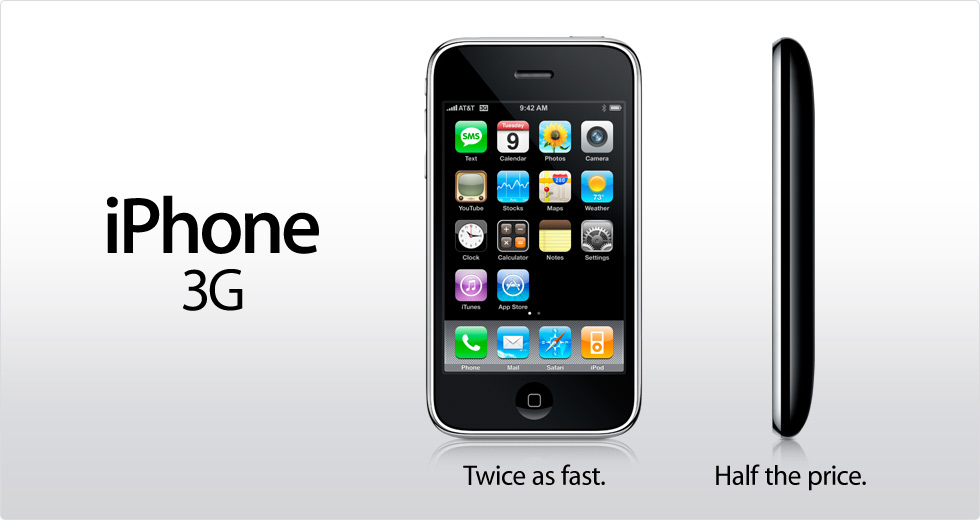After a year of waiting, Australians can soon buy the world's hottest mobile phone, the Apple iPhone. reports JOHN HARRIS, who has already put his name on the waiting list.
 As predicted in the Independent Weekly last month (May 9),
Apple has launched its new generation 3G iPhone, which will be available from
July 11.
As predicted in the Independent Weekly last month (May 9),
Apple has launched its new generation 3G iPhone, which will be available from
July 11.
Apple CEO Steve Jobs this week announced the much-anticipated iPhone makeover, unveiling a sleeker, cheaper and faster unit to Apple's World Wide Developer Conference 2008 in San Francisco.
In this country, Optus and Vodafone have stuck up their hands to resell the new unit. Optus is already taking fully-refundable $50 deposits from its customers for the right to join a two-hour priority queue for the iPhone when it becomes available (details at www.yesiphone.com.au/).
Apple is punching out the message that its iPhone is twice as fast and half the price of its predecessor. Although Australian prices were unavailable at press time, the 3G iPhone will cost US$199 for an 8GB version and US$299 for the 16GB unit.
For business customers, the 3G iPhone supports enterprise features like Microsoft Exchange, which provides easy access to company email, calendar and contact data, as well as GPS mapping.
However, unlike last year, when the iPhone wiped the floor with its rivals, the launch of the 3G model this year will face more concerted competition.
One contender is Taiwan-based HTC, whose CEO Peter Chou is scheduled to fly into Sydney for a June 24 launch of a new touchscreen HTC phone that offers an alternative to the iPhone.
This may be the widely-touted Touch Diamond, a Windows Mobile 6-based smartphone aimed at consumers. The touchscreen phone is designed to make it easy for users to check out content on websites such as YouTube and Google Maps.
The original iPhone created massive excitement by its breakthrough combination of touchscreen phone handset, a widescreen iPod and easy-to-use Internet access with rich HTML email and a desktop-class web browser.
What the 3G version adds to this cocktail is speed.
The 3G iPhone uses a communication protocol called HSDPA (High-Speed Downlink Packet Access) to download data fast. This allows email attachments and website pages to load twice as fast on 3G (third generation) carrier networks compared with 2G (second generation) networks.
Because the handset automatically switches between 2G, 3G and wireless local area networks, the iPhone will download data at the fastest speed possible (and in the case of a WiFi network, without eating up your monthly mobile phone allowance).
It also allows you to easily use an iPhone to make calls or access data services in most countries using either 3G carrier networks or 2G networks.
The 3G iPhone's extra speed also unlocks improved performance for applications such as GPS (Global Positioning Systems) services, which use data from earth-orbiting satellites to find locations.
Apple reports that the iPhone 3G uses signals from GPS satellites, WiFi hot spots and cellular towers to get the most accurate location fast. If GPS is unavailable, iPhone uses an Assisted GPS function to look for a WiFi hotspot or a cellular mobile phone tower to identify your location.
Benefits include allowing you to "geotag" photos when you use the iPhone camera or map your progress on an area map using the Maps on iPhone application.
Importantly, the iPhone's battery life has been boosted to support 10 hours of talk-time, double the first generation phone. Battery life was the reason Steve Jobs gave for not releasing a 3G phone last year.
So at last Australians will have their chance to decide whether the iPhone is more than hypePhone.
Related News
- As Bill bails, Microsoft faces online onslaught As Bill Gates signs off from his day job after 33 years, JOHN HARRIS looks at the unprecedented challenge facing Microsoft from an online onslaught of free software.. Bill G...
- Apple bites Microsoft where it hurts As Apple has overtaken Microsoft as the world's most valuable technology company, JOHN HARRIS examines the dramatic turnaround in fortunes of the Cupertino-based company that was f...
- Better broadband for the outback As politicians squabble about the proposed National Broadband Network, JOHN HARRIS looks at Australia's track record of using technology to overcome the tyranny of distance.In May ...
- Tablet just the medicine for people on the move What a difference a year makes! JOHN HARRIS looks at how the great technology fad of 2009, the netbook, has gone from must-have fashion to forgotten with the arrival of a new fab f...












